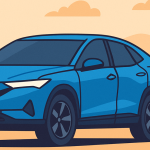Have you ever wondered what the world’s 1st vehicle ever made looked like and how it transformed our daily lives? Today, cars are a necessity for families, professionals, racers, and eco-conscious drivers, but the journey started with one groundbreaking invention. From steam-powered machines to electric vehicles dominating trends today, the evolution of automobiles tells the story of human progress, innovation, and ambition.
In this blog, we’ll explore the origins of the first car, examine how vehicles evolved, highlight crucial trends in the modern era, and understand the impact on global transportation.
Origins of the 1st Vehicle Ever Made
The 1st vehicle ever made can be traced to the late 18th century. In 1769, Nicolas-Joseph Cugnot, a French inventor, created a steam-powered vehicle designed to transport artillery. This “Fardier à vapeur” was massive, slow, and difficult to run but laid the foundation for automobile engineering.
Fast forward to 1886, German engineer Karl Benz officially patented the Benz Patent-Motorwagen, widely regarded as the first practical, modern car powered by an internal combustion engine. With three wheels, a top speed of just 10 mph (16 km/h), and an engine producing less than 1 horsepower, it revolutionized human mobility.
Key Milestones in Automobile History
Steam Vehicles (1769–1800s)
First attempts used steam engines to power vehicles.
Heavy, inefficient, and impractical for everyday use.
Internal Combustion Engine Cars (1880s)
Karl Benz’s invention marked a turning point.
Affordable mobility became possible.
Mass Production by Ford (1908)
Henry Ford introduced the Model T, the world’s first mass-produced car.
Vehicle ownership became a reality for middle-class families.
Post-War Automotive Boom (1950s–1970s)
Cars symbolized freedom, luxury, and status.
Global demand skyrocketed, with Japan and Germany emerging as auto leaders.
Modern Electric & Hybrid Cars (2000s–Today)
Tesla, Toyota, and others shifted focus toward sustainability, eco-friendly driving, and autonomous tech.
Global efforts now push for zero-emission mobility.
How the 1st Vehicle Shaped Today’s Cars
The historical journey of automobiles is more than just machines evolving—it’s about shaping lifestyle and culture.
For Families: From cramped three-wheelers to spacious SUVs.
For Luxury Seekers: Introduction of premium interiors, AI-driven features, and high-end performance.
For Racers: Evolution of high-speed vehicles from Formula 1 to endurance racing inspired by early breakthroughs.
For Eco-Conscious Drivers: The same innovative spirit behind the 1st vehicle ever made has led today’s shift toward electric mobility.
Current Trends Influenced by the 1st Vehicle Ever Made
Rise of Electric Vehicles (EVs)
Global policy changes and consumer demand fuel EV growth. Tesla’s domination and new players like BYD and Rivian have reshaped the market.
Smart and Autonomous Cars
AI-driven assistance systems are making cars safer and more intelligent—a far cry from Karl Benz’s hand-cranked Motorwagen.
Shared Mobility and Car Subscription Models
You no longer need to own a car to enjoy one. Ride-sharing services and subscriptions expand accessibility globally.
Lightweight and Sustainable Materials
From carbon fiber to aluminum bodies, modern automakers innovate with eco-friendly designs without losing performance.
What Today’s Drivers Can Learn from the 1st Vehicle
Innovation is key: Automobiles will always evolve.
Sustainability matters: The push for electric mobility mirrors concerns that go back centuries.
Accessibility drives adoption: Just as Ford made cars affordable in 1908, future automakers must make EVs and smart cars accessible.
Adaptation ensures survival: Industries that embrace new tech thrive, while others get left behind.
Actionable Tips When Exploring Vehicle Evolution
Visit Auto Museums: Explore exhibits featuring early cars like Benz’s Motorwagen.
Follow EV Trends: Stay updated on charging infrastructure, government incentives, and new launches.
Think Long-Term Investment: Consider not just purchase price but fuel, maintenance, and eco-impact.
Learn Driving Culture: Understand how cars influenced freedom, economy, and lifestyle across countries.
FAQs on the 1st Vehicle Ever Made
1. Who built the 1st vehicle ever made?
Nicolas-Joseph Cugnot built the first steam vehicle in 1769, but Karl Benz is credited with creating the first practical gasoline car in 1886.
2. What powered the 1st vehicle ever made?
Cugnot’s vehicle used a steam engine, while Benz’s Motorwagen used a single-cylinder gasoline engine.
3. How fast was the Benz Patent-Motorwagen?
Its top speed was about 10 miles per hour (16 km/h).
4. How did the 1st vehicle impact modern cars?
It laid the foundation for transportation, mass production, and eventually modern innovations like hybrids and EVs.
5. What’s the latest trend inspired by this evolution?
Electric vehicles, autonomous driving, and sustainable designs are the most significant contemporary shifts.
Final Thoughts
The story of the 1st vehicle ever made is more than history—it’s the beginning of human freedom on wheels. From steam-powered giants to sleek electric cars, innovation has never stopped. As we move toward a future of autonomous EVs, the legacy of Cugnot and Benz remains alive in every car we drive today.
If you’re exploring the world of cars—whether as a family buyer, luxury seeker, eco-conscious driver, or speed enthusiast—know that your journey continues a tradition that began centuries ago.
Ready to explore more about the history and future of cars? Subscribe to our blog today and stay updated with the latest automotive trends!








